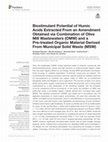Papers by Giuseppe CELANO
III International Symposium on Irrigation of Horticultural Crops 537, Jun 28, 1999
Abstract: Minirhizotrons were used to observe, throughout the annual cycle, the root length densi... more Abstract: Minirhizotrons were used to observe, throughout the annual cycle, the root length density (RLD, cm cm-3) of fine roots in young olive trees (Olea europaea L., cv. Coratina) grown in irrigated and rainfed conditions. The trial was carried out in a semi-arid Mediterranean environment of Southern Italy. The root length density at different depths and distances from the trunk was examined during winter rest, flowering, and pit hardening.

Agronomy
Horticultural farms are faced with the problem of disposing of huge amounts of agricultural by-pr... more Horticultural farms are faced with the problem of disposing of huge amounts of agricultural by-products whose management requires sustainable solutions. Composting means to recycle organic waste to make compost—a high agronomic value product—able to positively affect soil quality: A good occasion to switch definitively from a conventional agriculture to an organic one. Nevertheless, composting can have negative direct/indirect environmental impacts. The aim of this research was to assess the sustainability of a windrow composting system, able to treat agricultural green waste of different typology (“light” and “heavy” with dry matter below or above 10%, respectively). Environmental impacts, energy consumptions, and production costs of all composting stages were evaluated by Life Cycle Assessment. Results show that the production of 1 ton of compost caused CO2eq emissions ranging from 199 to 250 kg and required between 1500 and 2000 MJ of energy; costs ranged between 98 and 162 euro,...

Frontiers in plant science, 2018
Olive mill wastewaters (OMW) contain significant levels of phenolic compounds with antimicrobial/... more Olive mill wastewaters (OMW) contain significant levels of phenolic compounds with antimicrobial/phytotoxic activity and high amounts of undecomposed organic matter that may exert negative effects on soil biology. Among OMW detoxification techniques, those focusing on oxidative degradation of phenolic compounds are relevant. The composting (bio-oxidation) process in particular, exploits exothermic oxidation reactions by microorganisms to transform the organic matrix of OMW into an amendment biologically stable and feasible to use in agriculture. This process consists of an active phase during which organic compounds are rapidly decomposed, and a curing phase characterized by a slow breakdown of the remaining materials with the formation of humic substances (HS) as by-products. In this study, bio-oxidation of OMW was performed using a pre-treated organic material derived from municipal solid waste (MSW). The obtained amendment (OMWF) was stable and in accordance with the legislative ...
Acta Horticulturae, 1999
Abstract: The aims of this study were to evaluate the effect of different training systems on the... more Abstract: The aims of this study were to evaluate the effect of different training systems on the evolution of leaf area and on the amount of intercepted photosynthetic photon flux density (PPFD), and to ascertain the effect of the different amount of PPFD available within the canopy on yield and fruit quality of cultivar Tirynthos.
Acta Horticulturae, 2008
Abstract: Effects of exposure to light and air movement on the accumulation of some mineral eleme... more Abstract: Effects of exposure to light and air movement on the accumulation of some mineral elements in fruit of kiwifruit (Actinidia deliciosa (A. Chev.) CF Liang et AR Ferguson var. deliciosa) are presented. Exposed fruit (> 40% full sunlight) exhibited calcium content twice that of shaded fruit (< 20% full sunlight). Trends of Ca accumulation are discussed in relation to various known physiological and morphological fruit traits. Xylem functionality, fruit transpiration, fruit hair viability and fruit hydraulic conductance show significant changes ...
Acta Horticulturae, 2006
Abstract: An appropriate orchard management is a necessary condition for high quality production ... more Abstract: An appropriate orchard management is a necessary condition for high quality production with respect to environmental aspects such as a) organic matter depletion, which leads to the desertification phenomenon; b) water shortage; c) soil alkalinization and salinization processes; d) aquifers pollution; e) nitrogen and carbon gas emissions. In this paper we discuss the most appropriate practices to preserve soil fertility and improve the efficiency of water and mineral resources. Soil incorporation of green manure, pruned ...
Acta Horticulturae, 1997
Abstract: The aim of this study was to determine the effects of water stress on total water poten... more Abstract: The aim of this study was to determine the effects of water stress on total water potential components, tissue water content, maximum elastic modulus and osmoregulation capacity evaluated by means of the pressure-volume curves technique. The trial was conducted using two year-old ownrooted olive trees, cv." Coratina", grown in 18 l containers and subjected to different stress levels determined on the basis of predawn leaf water potential measurements. Osmotic potentials at saturation (pi 100) were-2.06 MPa in ...
Riassunto Si riportano i primi risultati di uno studio condotto in oliveti in ambiente semi-arido... more Riassunto Si riportano i primi risultati di uno studio condotto in oliveti in ambiente semi-arido mediterraneo al fine di ottenere informazioni sulla vegetazione spontanea presente negli stessi. Il numero totale di specie rinvenute nelle aree considerate è stato di 83, a testimonianza di una elevata diversità floristica presente nelle zone interessate da tali indagini.
Uploads
Papers by Giuseppe CELANO